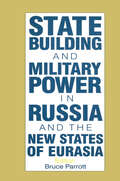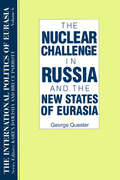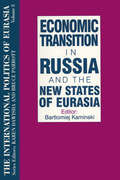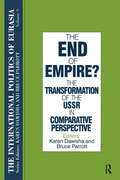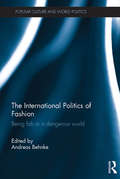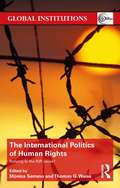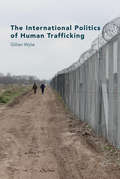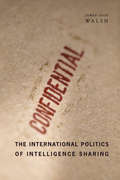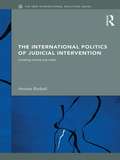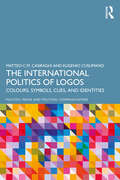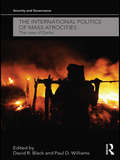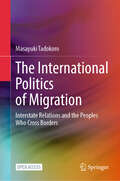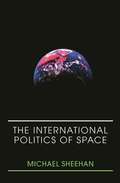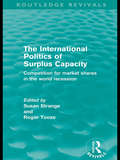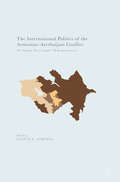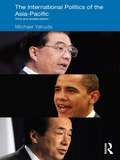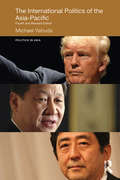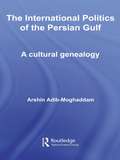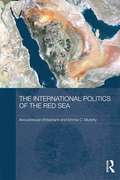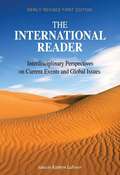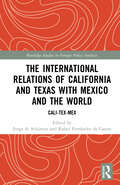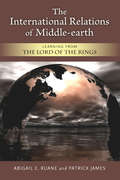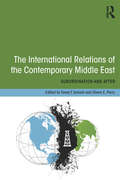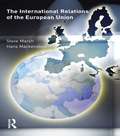- Table View
- List View
The International Politics of Eurasia: v. 5: State Building and Military Power in Russia and the New States of Eurasia
by S. Frederick Starr Karen DawishaThis ambitious ten-volume series develops a comprehensive analysis of the evolving world role of the post-Soviet successor states. Each volume considers a different factor influencing the relationship between internal politics and international relations in Russia and in the western and southern tiers of newly independent states. The collapse of the Soviet Union and the discrediting of Marxism-Leninism as a source of political legitimacy have prompted a search for fresh principles of political organization that will shape the nature of political culture in all the post-Soviet countries. This volume looks at military power and state building.
The International Politics of Eurasia: v. 6: The Nuclear Challenge in Russia and the New States of Eurasia
by S. Frederick Starr Karen DawishaFirst Published in 1996. Routledge is an imprint of Taylor & Francis, an Informa company.
The International Politics of Eurasia: v. 8: Economic Transition in Russia and the New States of Eurasia
by S. Frederick Starr Karen DawishaFirst Published in 1996. This ambitious ten-volume series develops a comprehensive analysis of the evolving world role of the post-Soviet successor states. Each volume considers a different factor influencing the relationship between internal politics and international relations in Russia and in the western and southern tiers of newly independent states. The contributors were chosen not only for their recognized expertise but also to ensure a stimulating diversity of perspectives and a dynamic mix of approaches. This is Volume 8 Economic Transition in Russia and the New States of Eurasia.
The International Politics of Eurasia: v. 9: The End of Empire? Comparative Perspectives on the Soviet Collapse
by S. Frederick Starr Karen DawishaFirst Published in 1997. Routledge is an imprint of Taylor & Francis, an Informa company.
The International Politics of Fashion: Being Fab in a Dangerous World (Popular Culture and World Politics)
by Andreas BehnkeThis book seeks to address and fill a puzzling omission in contemporary critical IR scholarship. Following on from the aesthetic turn in IR, critical and ‘postmodern’ IR has produced an impressive array of studies into movies, literature, music and art and the way these media produce, mediate, and represent international politics. By contrast, the proponents of the aesthetic turn have overlooked fashion as a source of knowledge about global politics. Yet stories about the political role of fashion abound in the news media. Margaret Thatcher used dress to define her political image, and more recently the fascination with Michelle Obama, Carla Bruni and other women in similar positions, and the discussions about the appropriateness of their wardrobes, regularly makes the news. In Sudan, a female writer and activist successfully challenged the government over her right to wear trousers in public and in Europe, the debate on women’s headscarves has politicised a garment item and turned it into a symbol of fundamentalism and oppression. In response, the contributors to this book investigate the politics of fashion from a variety of perspectives, addressing theoretical as well as empirical issues, establishing the critical study of fashion and its protagonists as a central contribution to the aesthetic turn in international politics. The politics of fashion go beyond these examples of the uses and abuses of textiles and fabrics for political purposes, extending into its very ‘grammar’ and vocabulary. This book will be a unique contribution to the field and will be of interest to students and scholars of international relations, critical IR theory and popular culture and world politics.
The International Politics of Human Rights: Rallying to the R2P Cause? (Global Institutions)
by Thomas G. Weiss Mónica SerranoThe responsibility to protect (R2P) is at a crossroads, the latest in a journey that is only ten years old. This book present debates on the prevention of mass atrocities to R2P’s normative prospects. The book addresses key questions as a way to inform and drive on-going conversations about R2P. Moving beyond well-rehearsed debates about the tensions and meanings around sovereignty in R2P practice, the book focuses on advancing the credibility of the preventive dimensions of R2P, whilst simultaneously examining the extent of R2P’s current value-added in state decision making—especially for the 2011 actions in Libya and Côte d’Ivoire. Questions addressed include: Did the R2P framework of the 2005 World Summit Declaration intend to mould sovereignty, and if so how? Can R2P break or revert cycles of violence? How can one determine the appropriate duration and timing of the preventive and protective phases of R2P? Who/what should be the targets of preventive action, and how does this have an impact on R2P diplomacy? Under which conditions are particular policy tools likely to be effective? Which state and regional actors are best suited to using these tools? What are the barriers to successful preventive action—how can they be overcome? What capacities need to be built (at the national, regional, and international levels) in order to operationalize R2P’s preventive agenda? Examining a wide range of countries, this work will be essential reading for students and scholars of international human rights, international organizations, peacekeeping and conflict resolution.
The International Politics of Human Trafficking
by Gillian WylieThis book explores the international politics behind the identification of human trafficking as a major global problem. Since 2000, tackling human trafficking has spawned new legal, security and political architecture. This book is grounded in the premise that the intense response to this issue is at odds with the shaky statistics and contentious definitions underpinning it. Given the disparity between architecture and evidence, Wylie asks why human trafficking has become widely understood as a threat to personal and state security in today's world. Relying on the idea of 'norm lifecycle' from constructivist International Relations, this volume traces the rise and impact of anti-trafficking activism. Global common knowledge about trafficking is now established, but at a cost. Taking issue with the predominant framing of trafficking as sexual exploitation, this book focuses on how contemporary globalization causes labour exploitation, while the concept of trafficking legitimates states' securitized responses to migration.
The International Politics of Intelligence Sharing
by Walsh James IgoeThe cross-border sharing of intelligence is fundamental to the establishment and preservation of security and stability. The American invasion of Iraq in 2003 was based in part on flawed intelligence, and current efforts to defeat al Qaeda would not be possible without an exchange of information among Britain, Pakistan, Indonesia, and the United States. While critical to national security and political campaigns, intelligence sharing can also be a minefield of manipulation and maneuvering, especially when secrecy makes independent verification of sources impossible. In The International Politics of Intelligence Sharing, James Igoe Walsh advances novel strategies for securing more reliable intelligence. His approach puts states that seek information in control of other states' intelligence efforts. According to this hierarchical framework, states regularly draw agreements in which one power directly monitors and acts on another power's information-gathering activities-a more streamlined approach that prevents the dissemination of false "secrets." In developing this strategy, Walsh draws on recent theories of international cooperation and evaluates both historical and contemporary case studies of intelligence sharing. Readers with an interest in intelligence matters cannot ignore this urgent, timely, and evidence-based book.
The International Politics of Intelligence Sharing
by James Igoe WalshThe cross-border sharing of intelligence is fundamental to the establishment and preservation of security and stability. The American invasion of Iraq in 2003 was based in part on flawed intelligence, and current efforts to defeat al Qaeda would not be possible without an exchange of information among Britain, Pakistan, Indonesia, and the United States. While critical to national security and political campaigns, intelligence sharing can also be a minefield of manipulation and maneuvering, especially when secrecy makes independent verification of sources impossible. In The International Politics of Intelligence Sharing, James Igoe Walsh advances novel strategies for securing more reliable intelligence. His approach puts states that seek information in control of other states' intelligence efforts. According to this hierarchical framework, states regularly draw agreements in which one power directly monitors and acts on another power's information-gathering activities-a more streamlined approach that prevents the dissemination of false "secrets." In developing this strategy, Walsh draws on recent theories of international cooperation and evaluates both historical and contemporary case studies of intelligence sharing. Readers with an interest in intelligence matters cannot ignore this urgent, timely, and evidence-based book.
The International Politics of Judicial Intervention: Creating a more just order (New International Relations)
by Andrea BirdsallThis volume considers the most recent demands for justice within the international system, examining how such aspirations often conflict with norms of state sovereignty and non-intervention. From an interdisciplinary approach that combines issues of International Relations with International Law, this book addresses issues neglected in both disciplines concerning the establishment a more just international order and its political implications. Through detailed examples drawn from key developments in international law, the author explores how new norms develop within international society, and how these norms generate both resistance and compliance from state actors. Case studies include: Pinochet and the House of Lords The Congo versus Belgium at the International Court of Justice The establishment of the ad hoc war crimes tribunal for the Former Yugoslavia The creation of the International Criminal Court and US opposition. The International Politics of Judicial Intervention will be of interest to students and scholars of International Relations, Human Rights and International Law.
The International Politics of Logos: Colours, Symbols, Cues, and Identities (Politics, Media and Political Communication)
by Eugenio Cusumano Matteo C.M. CasiraghiThe International Politics of Logos provides the first systematic analysis of logos and the role they play in international politics. Whilst there is growing scholarly interest in visual politics, logos have largely remained hidden in plain sight despite being the most important symbol of a variety of organizations. Visual artefacts, such as logos, play an increasingly central role in politics. Candidates running for office carefully choose the images they share on social media, political parties devise effective brands, and NGOs use visual artefacts for advocacy and advertisement. Visual artefacts are also vital for violent non-state actors, ranging from private military and security companies (PMSCs) to terrorists. This book provides a wealth of data on the logos chosen by a variety of organizations, examining how they vary between actors, across types of organizations, and over time. It offers methodological innovations to the study of logos and visual politics, highlighting the potential of combining quantitative and qualitative methodologies to study the colours, symbols, and types of logos and other visual artefacts. The book examines the role of colours as cues and the causal connection between chromatic choices and ideology, the influence of socialization and norm diffusion dynamics in the choice to showcase (or scrap) specific symbols, and the relationship between branding decisions and the structure and strategies of specific organizations. This book will appeal to students and scholars of visual politics and visual communication, as well as those researching political parties, PMSCs, and terrorist groups. It will also be of interest to political, security, and marketing professionals.
The International Politics of Mass Atrocities: The Case of Darfur (Security and Governance)
by Paul D. Williams David R. BlackThe ongoing crisis in Darfur, Sudan has stimulated a huge amount of political and academic interest across the world. The crisis has been both reflective and constitutive of key areas of contestation and change within contemporary international society. This book examines the crisis in Darfur as a case study of some of the wider debates currently taking place within International Relations theory. Using the conceptual framework developed by English School theorists, specifically their concept of international society and the related idea of "good international citizenship", this book examines a wide range of issues: foreign policy analysis, theories of norm diffusion, international organizations, peace operations, international criminal justice and war law, the causes and nature of contemporary warfare, and the international relations of Africa. Making an important contribution to the debate about the meaning and limits of international society, this book will be of interest to students and scholars international relations theory, international security, foreign policy, international organizations, human rights, African politics, genocide studies and international law.
The International Politics of Migration: Interstate Relations and the Peoples Who Cross Borders
by Masayuki TadokoroThis open access book discusses the impact of cross-border migration on the relationships between sovereign states. While there is already a vast amount of literature on immigration, it often focuses on issues such as human rights, citizenship, and social integration, reflecting the contemporary interests of Western countries. However, as long as the most fundamental norm of international politics remains the mutual recognition of exclusive jurisdictional rights over territory by sovereign states, people crossing borders pose various challenges to this system of sovereign states. It is this awareness of the issue that makes this book unique. This book examines the implications of the movement of people across national borders both for the state and for international politics. From the standpoint of international politics, the focus of the examination is the international political meaning of the transnational phenomenon of the movement of people. This is an interest that extends from the study of international political economy, which questions the significance for international politics of the transnational phenomena of international trade and international finance.
The International Politics of Space: International Relations Theory And The Politics Of Space (Space Power And Politics Ser.)
by Michael SheehanThe year 2007 saw the fiftieth anniversary of the Space Age, which began with the launching of Sputnik by the Soviet Union in October 1957. Space is crucial to the politics of the postmodern world. It has seen competition and cooperation in the past fifty years, and is in danger of becoming a battlefield in the next fifty. The International Po
The International Politics of Surplus Capacity: Competition for Market Shares in the World Recession (Routledge Revivals)
by Susan Strange Roger ToozeThis important survey, first published in 1981, presents some different and often contending perceptions of the problem of surplus capacity as it re-emerged in the world of the 1980s – an economic climate with many parallels to the current era. Susan Strange and Roger Tooze deliberately assembled writers of many different nationalities, professional backgrounds and ideological convictions and asked them to make the case for their version of the problem. Some even doubt if there really is much of a problem at all. Others see it as fundamentally political, or monetary; as inherent in the capitalist system, or as the product of short-sighted pressure groups and perverse politicians. To help readers judge for themselves, there are specialist contributions on surplus capacity as it has shown up in different sectors of the world economy – shipbuilding, textiles, steel, petrochemicals, insurance and banking – and on the responses of different actors in the international system, including the European Community and multinational corporations.
The International Politics of the Armenian-Azerbaijani Conflict
by Svante E. CornellThis book frames the Armenian-Azerbaijani conflict over Nagorno-Karabakh in the context of European and international security. It is the first book to focus on the politics of the conflict rather than the dispute itself. Since their emergence twenty years ago, this and other "frozen conflicts" of Eurasia have been affected by transformations in European security, and many ways absorbed into an ever fiercer geopolitical struggle for influence. The wars in Georgia and Ukraine brought greater attention to some unresolved conflicts, but not to the conflict between Armenia and Azerbaijan. As the contributors to this volume argue, the conflict merits much greater European attention, for several reasons: it is on a path of escalation, existing mediation regimes are dysfunctional, and as both Georgia and Ukraine have showed, any outbreak of serious fighting will force the EU to respond. This book thus explains the interlocking interests of Russia, Turkey, Iran, the EU and United States in the conflict, and analyzes the negotiation process and the conflict's international legal aspects.
The International Politics of the Asia Pacific: Third and Revised Edition (Politics in Asia)
by Michael YahudaThis fully revised third edition of Michael Yahuda's extremely successful textbook brings the region fully up-to-date, introducing students to the international politics of the Asia-Pacific region since 1945. As well as assessing the post-Cold War uncertainties that challenged the balance and power within the region, Yahuda also examines the first decade of the new millennium which includes no let up on the 'war on terror', new political administrations in all the key player-states and increased cooperative security between some nations, polarized by volatile relationships between others. Analyzing politics in terms of global, regional and local trends, this new edition features: In-depth discussion of the Bush administration's legacy and where the Obama administration's vision takes their policy Analysis of post-Koizumi/post-Abe Japan Examination of the continued rise of China in terms of politics, security and economic dominance Ongoing debates concerning the 'war on terror' and how this shifts, forms and reforms relationships Asia-Pacific security issues This new third edition will continue to be a core text for students of Asian politics, international relations and Cold War history.
The International Politics of the Asia-Pacific: Fourth and Revised Edition (Politics in Asia)
by Michael YahudaThis fully revised fourth edition of Michael Yahuda's successful textbook brings the subject up-to-date, introducing students to the international politics of the Asia-Pacific region since 1945. As well as assessing the post-cold War uncertainties that challenged balance and power with the region, the book also examines the first two decades of the new millennium, which includes no let up on the 'war on terror', new political administrations in all the key player-states and increased cooperative security between some nations, polarised by volatile relationships between others. Analyzing politics in terms of global, regional and local trends, this new edition features: Discussion and evaluation of the Trump Presidency and its implications for the Asia-Pacific region Analysis of Japan’s more assertive foreign policy Examination of the continued Rise of China under Xi Jinping in terms of politics, security, economic dominance and territorial conflicts in the region Ongoing debates concerning the 'war on terror' and how this shifts, forms and reforms relationships Explanation of how America’s war’s in the greater Middle East and the financial crash of 2008 undermined the American led international order. This new fourth edition will continue to be a core text for students of Asian politics, international relations and Cold War history.
The International Politics of the Persian Gulf: A Cultural Genealogy (Routledge Studies in Middle Eastern Politics)
by Arshin Adib-MoghaddamAdib-Moghaddam examines the causes and consequences of conflict in one of the most important regions of the world. Bridging the gap between critical theories of international relations and the empirical study of the Gulf area, this book expands on the many ideologies, cultural inventions and ideational constructs that have affected relations in the past three decades. Key issues explored include: the rise and fall of Arab and Persian nationalism the international repercussions of the Islamic revolution in Iran the events surrounding the three Gulf Wars the 'mindset' of terrorist networks such as al-Qaeda why US neo-conservatism is threatening regional order. Provocatively written, persuasively researched and conclusively argued, The International Politics of the Persian Gulf presents the first comprehensive analysis of international relations in the Gulf from an explicitly multidisciplinary perspective.
The International Politics of the Red Sea (Durham Modern Middle East and Islamic World Series)
by Anoushiravan Ehteshami Emma C. MurphyThis pioneering book is the first comprehensive study of the Red Sea as a sub-region of the international system in its own right. Examining the international politics of the Red Sea region from the Cold War to the present day, it argues that the Red Sea area demonstrates the characteristics of a sub-regional system, given its increasing economic and social interdependence, greater regional integration, and flows of resources across it. It details how stronger regional powers - Egypt, Israel and Saudi Arabia - which co-habit the sub-region with much weaker, vulnerable and fragile states, are seeking to stamp their own authority on this dynamic sub-region. They have attempted to do so, the authors show, through extension of their military and economic influence where ever possible, while also forging regional partnerships aimed at protecting their interests or to fend off possible encroachment of others. The book discusses in great detail the security and military dynamics of the sub-region; land and maritime borders; as well as economic issues, including trade, migration, capital flows and transport. It covers developments across the Red Sea and also within all the states of this newly-forming sub-region.
The International Reader: Interdisciplinary Perspectives on Current Events and Global Issues
by Kathryn Schaeffer LafeverThe International Reader: Interdisciplinary Perspectives on Current Events and Global Issues provides students with diverse insights into major world regions and an array of complex topics and current events. The book is organized into chapters on each of the six major world regions: Africa, Asia, Europe, Latin America, the Middle East, and Oceania. It features an extensive vocabulary, regional maps, and a list of countries in each region. The anthology employs an interdisciplinary approach, encouraging students to question, discuss, and analyze global issues across a range of disciplines and fields of study. Topics addressed include the recent surge of populism in Europe, the effects of climate change in Oceania, Islamist extremism in East Africa, the remittance economy in the Middle East, the economic and migrant crisis in Venezuela, and more. The newly revised first edition features new content on poverty and colonialism in Africa, cuteness as Japan's millennial product, authoritarianism in Egypt, the ongoing legacy of colonialism in Australia, and the confluence of sustainability and social justice issues.
The International Relations of California and Texas with Mexico and the World: Cali-Tex-Mex (Routledge Studies in Foreign Policy Analysis)
by Rafael Fernández de Castro Jorge A. SchiavonThis book analyzes the international relations of Mexico and the two most important sub-state governments of the United States, California and Texas. It explains why and how these two states conduct their international relations (IR) with Mexico and the world, and how national authorities and local governments coordinate in the definition and implementation of their international policies. Expert contributors from across the Americas offer a historical and current analysis, exploring which areas of cooperation—trade, investment, border cooperation, energy, migration—matter most. They also consider the institutional and legal bases of Mexican and U.S. states’ international relations, the changing nature of the U.S. federal system, the impact on international partners, the role of Latinos and the future of paradiplomacy in the region. The book will be of interest to scholars and students of International Relations, comparative politics, diplomacy, foreign policy, governance, and federalism, as well as business people, social leaders, and practitioners of diplomacy and paradiplomacy around the world.
The International Relations of Middle-earth: Learning from the Lord of the Rings
by Abigail E. Ruane Patrick JamesBased on their successful undergraduate course at the University of Southern California, Abigail E. Ruane and Patrick James provide an introduction to International Relations using J. R. R. Tolkien's fantastically popular trilogy The Lord of the Rings. Because Tolkien's major themes---such as good versus evil and human agency versus determinism---are perennially relevant to International Relations, The Lord of the Rings is well suited for application to the study of politics in our own world. This innovative combination of social science and humanities approaches to illustrate key concepts engages students and stimulates critical thinking in new and exciting ways.
The International Relations of the Contemporary Middle East: Subordination and Beyond (Contemporary Issues In The Middle East Ser.)
by Tareq Y. Ismael Glenn E. PerryThe Middle East, a few decades ago, was seen to be an autonomous subsystem of the global international political system. More recently, the region has been subordinated to the hegemony of a singular superpower, the US, bolstered by an alliance with Israel and a network of Arab client states. The subordination of the contemporary Middle East has resulted in large part from the disappearance of countervailing forces, for example, global bipolarity, that for a while allowed the Arab world in particular to exercise a modicum of flexibility in shaping its international relations.The aspirations of the indigenous population of the Middle East have been stifled by the dynamics of the unequal global power relationships, and domestic politics of the countries of the region are regularly subordinated to the prerogatives of international markets and the strategic competition of the great powers. Employing the concept of imperialism, defined as a pattern of alliances between a center (rulers) in the Center (developed) country and a center (client regime) in the Periphery (underdeveloped country) - as an overall framework to analyse the subordination of the region, this book is essential reading for students and scholars of the Middle East, International Relations, and Politics in general.
The International Relations of the EU
by Steve Marsh Hans MackensteinIn an incisive and lively discussion International Relations of the EU examines both the economic and security dimensions of European Union external relations. The book adopts an innovative approach that combines International Relations with International Political Economy.Set against a backdrop of EU enlargement and disarray over military intervention in Iraq, International Relations of the EU is a timely contribution to our understanding of the Eu's role as an international actor. The text is suitable for advanced undergraduate courses in Politics and International Relations.
